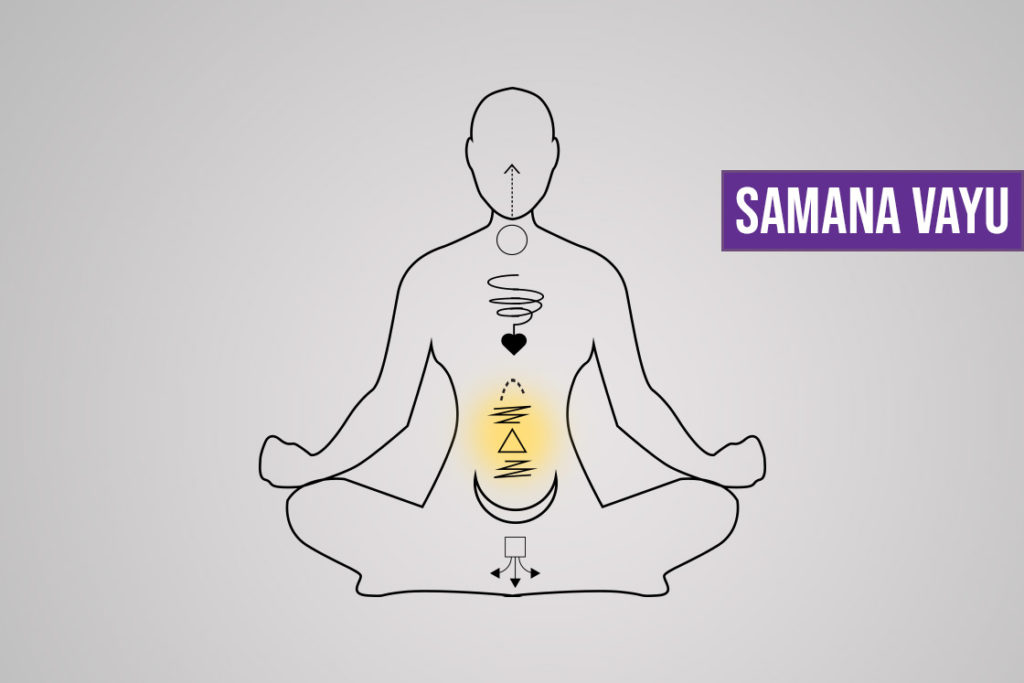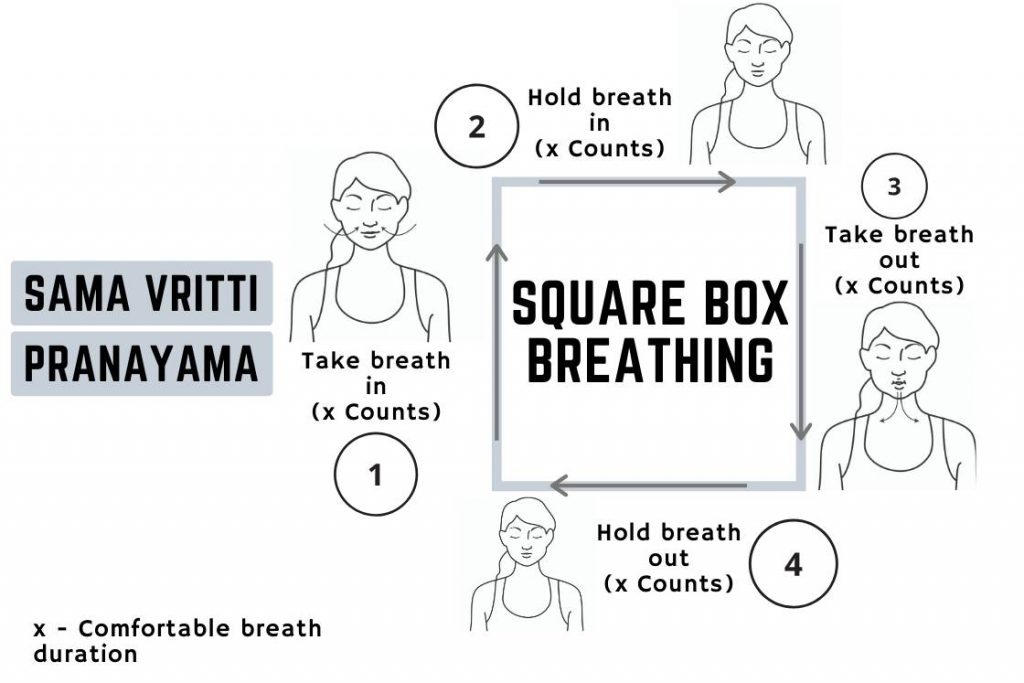
The Samana Vayu is another important vayu that plays an important role in establishing a healthy body and mind. And the connection of this vayu with the fire element makes it an essential component in churning and absorbing food, thoughts, and even breaths.
The transformative power of the Samana Vayu helps in maintaining physical and mental strength by providing energy through the distribution of nutrients throughout the body.
In this series of 5 Prana vayus, let us see how Samana Vayu functions, what happens if it is imbalanced and how we can keep it in balance.
What is Samana Vayu?
Samana is a Sanskrit term that means ‘Equal’ or ‘balancing’.
Samana vayu is known as balancing air in yoga. The purpose of this Vayu is to look over at the digestion of the food and information. Digestion happens at all levels in our body, be it the food we eat, the information we get throughout the day, and the thoughts and emotions we go through at every moment.
By giving energy to the digestive fire, it helps in creating power in the core.
The samana vayu is present in the abdominal region, majorly in the stomach and intestine while the energy spirals in the navel. It’s the place where nadis in our body originates. The spiral motion of the vayu signifies the churning/digestion, absorption, and assimilation of food, emotions, experiences, thoughts, feelings, and breath.
The navel center is also where the prana and apana vayu meet. So it can be said, Samana vayu regulates both prana and apana vayu. The meeting of vayus helps in the burning of the Agni or fire in this region. It’s, therefore, Agnyashaya (organ compared to Pancreas) is considered the place of samana vayu in the body.
Owing to its location, samana vayu is also connected to the Manipura or the Solar Plexus chakra.
Functions of Samana Vayu

The main function of the samana vayu is the digestion of food. It keeps the digestive fire alight and helps in the proper functioning of all the organs that are responsible for extracting nutrients from the food and filtering the waste for elimination.
Samana vayu is behind that energy which helps in retaining the food in the stomach for the complete breakdown of food. Without this, the food will not be properly passed through the intestines and it will lead to sluggish digestion.
Another important function of the Samana vayu is to segregate the food into digestible and indigestible. The nutrients that are absorbed and further passed on to the body are taken from digestible food. Whereas, the discarded portion is the indigestible food that will be eliminated through sweat, urine, or feces.
Segregation is an essential function of the vayu as, without this, all the food you eat would have been eliminated from the body, without you receiving any benefits of the nutrients.
The samana vayu also helps the apana vayu by catapulting the downward flow of the indigestible food. The balanced function of apana vayu is made possible by the samana vayu as it holds the sweat, menstrual blood, urine, and feces until the time of expelling them.
Lastly, the digestive fire remains strong due to the presence of samana vayu. If the samana vayu is weak, the digestive fire also becomes weak and the body suffers a loss of immunity, endurance, energy, and strength.
Signs of Imbalanced Samana Vayu
As the samana vayu is mostly related to the digestive system and is present in the abdominal region, it comes as no surprise that most imbalance signs will reflect an imbalance in the digestive system.
In our daily lives, if we are feeling out of balance, samana is likely to be affected.
An imbalance in samana vayu can also lead to a lack of enthusiasm and energy. Below are some additional symptoms that you may observe:
- Low metabolism
- Loss of appetite
- Bloating, indigestion
- Diarrhea
- Excessive sweating and thirst
- Obesity, malnourishment
- Irregular mentruation
- Infetility, Low libido
- Low motivation and confidence
- Poor judgement
- Failure to process emtions and thoughts
- Lack of understanding
- Feelings of ungroundedness
How to Balance the Samana Vayu

One of the best ways to balance the samana vayu is regulating inhalation and exhalation. For this, practise box breathing (aka Sama Vritti Pranayama). It emphasizes practising an equal length of inhaling, breath-hold and exhalation.
By matching the equal length of inhalation and exhalation, we are actually meeting up prana vayu to the apana vayu. When this happens, samana vayu comes to its balanced state.
Moreover, yoga asanas that involve twists, bends, and forwards folds will be extremely beneficial for keeping the samana vayu healthy. Asanas that involve the abdomen or core strength will improve the agni or fire. It will activate and energize the entire body. You can practice poses such as the Chair pose, Boat pose, Revolved Side Angle pose, Reclining Abdominal Twist, Seated Forward Fold, etc.
Practicing Kapalbhai (skull shining breath), Bhastrika (bellows breath), and Samavritti (equalizing breath), which generate inner heat, will keep the samana vayu balanced. These pranayama techniques will also help create an equilibrium on the mental level as well.
You can also practice Uddiyana Bandha or the abdominal lock to stimulate samana vayu. For this, while practising yoga asanas pull your navel back and up. Then nauli and agnisar kriya can be done. This will help in cleansing, massaging, and toning the abdominal muscles and the energy channels in the body.
In addition to the above remedies, you can also practice the Samana Mudra to balance samana vayu. This is done by joining the tips of all the fingers, which signifies the coming together of all the elements to create balance and harmony in the body.
Conclusion
Digestion is not only done in a physical manner, you also intake a ton of information, perceptions, and experiences on a daily basis. The processing of all that is essential to make our personality as well. Thus, the Samana Vayu plays an essential role in keeping the best and discarding the rest. It helps in keeping the fire burning and keeps us physically, mentally, and spiritually active.




 Oct 24th to 30th
Oct 24th to 30th Learn Mudras
Learn Mudras  Deepen Your Practice
Deepen Your Practice  Find Inner Peace
Find Inner Peace